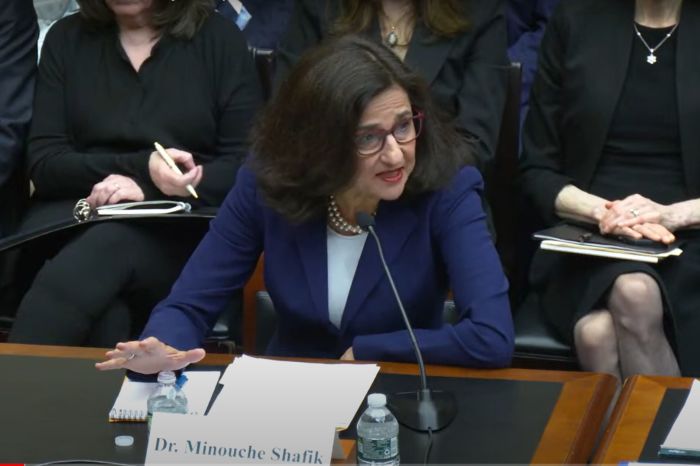Columbia University president says faculty's remarks on Israel 'unacceptable' at congressional hearing

WASHINGTON — Republican and Democratic lawmakers grilled Columbia University President Minouche Shafik about how the university addresses antisemitism, including cases involving faculty members who have publicly referred to Hamas’ Oct. 7 massacre as “awesome.”
On Wednesday, Columbia University President Minouche Shafik testified before the House Committee on Education and the Workforce alongside two board of trustees members and a longtime Columbia University faculty member. The purpose of the hearing was to discuss reports of a rise in antisemitic behavior among the university’s students and faculty.
At one point during the hearing, Rep. Suzanne Bonamici, D-Ore., asked the four witnesses if calling for the genocide of Jews violated the university’s code of conduct. All four of the witnesses answered “yes.”
Bonamici’s question was the same as that asked by Rep. Elise Stefanik, R-N.Y., to the university presidents of Harvard, the Massachusetts Institute of Technology and the University of Pennsylvania during a similar hearing in December. The responses from the three university presidents led to calls for their resignations after they failed to answer directly whether calling for genocide against Jews violated their institutions’ codes of conduct.
During the hearing, Shafik listed the steps the university has taken to address antisemitism, including the creation of a task force and listening sessions for students “on both sides of the issue.”
Stefanik asserted that Columbia University had not taken appropriate actions to discipline faculty members like Joseph Massad for antisemitism. Massad is a tenured professor of modern Arab politics and intellectual history at the university.
In October, Massad referred to Hamas’ Oct. 7 attacks as “awesome” in an essay for The Electronic Intifada, declaring that Israelis “may have finally realized that living on land stolen from another people will never make them safe.” Shafik had said earlier during the hearing that she spoke to the professor and that she was “appalled” by his rhetoric.
“Were there any other enforcement action taken?” Stefanik asked Shafik, who replied that Massad had not repeated those remarks, and that he had been removed from his position as chair of the Academic Review committee.
On the Columbia University website, Joseph Massad is listed as an “outgoing chair” of the Academic Review Committee. Stefanik said during the hearing that Massad’s name was still listed on the site, but Shafik claimed she could not answer whether his name had been removed.
Rep. Kathy Manning, D-N.C., also questioned Shafik about Massad, asking why the professor is still teaching at Columbia University. According to the university president, the school has “disciplinary processes” in place if a faculty member “cross[es] a line.” Shafik also told Manning that, to her knowledge, Massad is on the faculty, but he is not teaching anymore.
In addition to Massad, Stefanik highlighted the rhetoric of Columbia law professor Katherine Franke and visiting professor Mohamed Abdou. A few days after Hamas’ Oct. 7 massacre, Abdou wrote on Facebook he is “with the muqawamah (the resistance),” referring to Hamas, Hezbollah and Islamic Jihad.
The Republican representative read a statement from Franke, in which the professor declared that “All Israeli students who served in the I.D.F. [Israel Defense Forces] are dangerous and shouldn’t be on campus.”
Shafik said during the hearing that Abou had been terminated and that “he would never work at Columbia again.” As for Franke, the university president agreed that her comment was “unacceptable,” stating that a senior member of the school’s administration has spoken to the professor, who claimed the statement was “not what she intended to say.”
The Republican representative for New York accused Shafik of failing to take “disciplinary action.”
“Speaking to these professors is not enough,” Stefanik said. “And it’s sending a message across the university that this is tolerated, these antisemitic statements from a person with a position of authority in this classroom is tolerated.”
In a Wednesday statement following the hearing, Stefanik asserted that Shafik offered “inconsistent testimony” about the disciplinary actions taken against students and faculty who engage in antisemitic behavior.
Rep. Ilhan Omar, R-Minn., who has also been accused of antisemitism, asked Shafik Wednesday if she has ever seen a protest on campus against Jewish people. As the university president began to answer, Omar interrupted and moved on to another set of questions.
Stefanik later accused Shafik of changing her testimony after the congresswoman asked her a question about whether there had been “anti-Jewish protests” at Columbia University. Shafik told Stefanik that she was not able to finish her sentence when the question was first presented to her. The president clarified that the protests were not labeled as “anti-Jewish” but agreed that antisemitic things were said at many of those events.
Samantha Kamman is a reporter for The Christian Post. She can be reached at: samantha.kamman@christianpost.com. Follow her on Twitter: @Samantha_Kamman




























